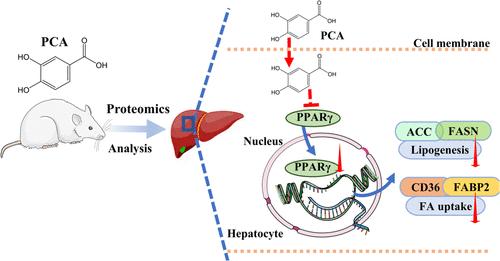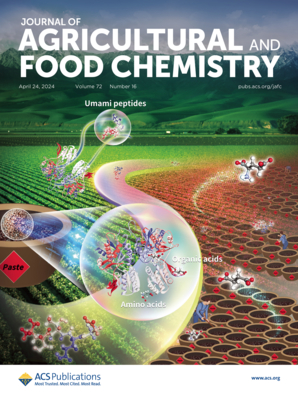Protocatechuic Acid Suppresses Lipid Uptake and Synthesis through the PPARγ Pathway in High-Fat Diet-Induced NAFLD Mice
IF 5.7
1区 农林科学
Q1 AGRICULTURE, MULTIDISCIPLINARY
引用次数: 0
Abstract
Nonalcoholic fatty liver disease (NAFLD) has become one of the most concerning health problems in the world. Dietary intervention is an effective way to prevent and improve NAFLD. As one of the main metabolites of anthocyanins, protocatechuic acid (PCA) exhibited strong activity to improve NAFLD, but the specific mechanism remains unclear. Currently, proteomics has been used to identify that PCA treatment could significantly influence the expression of 224 proteins, including 89 downregulated proteins and 135 upregulated proteins. KEGG analysis showed that PCA obviously inhibited the peroxisome proliferator-activated receptor (PPAR) signaling pathway. Immunofluorescence and Western blot analyses further confirmed that PCA repressed the protein expression of PPARγ and subsequently inhibited the expression of free fatty acid (FFA) uptake proteins (CD36 and FABP2) and FFA synthesis proteins (ACC and FASN), respectively. These effects of PCA contributed to the inhibitory activity of excessive lipid accumulation in the liver. Our results highlighted that PCA could effectively alleviate high-fat diet-induced (HFD) NAFLD by inhibiting lipid absorption and synthesis through the PPARγ signaling pathway.

非酒精性脂肪肝(NAFLD)已成为全球最令人担忧的健康问题之一。膳食干预是预防和改善非酒精性脂肪肝的有效方法。作为花青素的主要代谢产物之一,原儿茶酸(PCA)具有很强的改善非酒精性脂肪肝的活性,但其具体机制尚不清楚。目前,蛋白质组学研究发现,PCA治疗可显著影响224个蛋白质的表达,包括89个下调蛋白和135个上调蛋白。KEGG分析表明,PCA明显抑制了过氧化物酶体增殖激活受体(PPAR)信号通路。免疫荧光和Western印迹分析进一步证实,PCA抑制了PPARγ蛋白的表达,进而分别抑制了游离脂肪酸(FFA)摄取蛋白(CD36和FABP2)和FFA合成蛋白(ACC和FASN)的表达。五氯苯甲醚的这些作用有助于抑制肝脏中脂质的过度积累。我们的研究结果表明,PCA可通过PPARγ信号通路抑制脂质的吸收和合成,从而有效缓解高脂饮食诱导的非酒精性脂肪肝。
本文章由计算机程序翻译,如有差异,请以英文原文为准。
求助全文
约1分钟内获得全文
求助全文
来源期刊
CiteScore
9.90
自引率
8.20%
发文量
1375
审稿时长
2.3 months
期刊介绍:
The Journal of Agricultural and Food Chemistry publishes high-quality, cutting edge original research representing complete studies and research advances dealing with the chemistry and biochemistry of agriculture and food. The Journal also encourages papers with chemistry and/or biochemistry as a major component combined with biological/sensory/nutritional/toxicological evaluation related to agriculture and/or food.

 求助内容:
求助内容: 应助结果提醒方式:
应助结果提醒方式:


